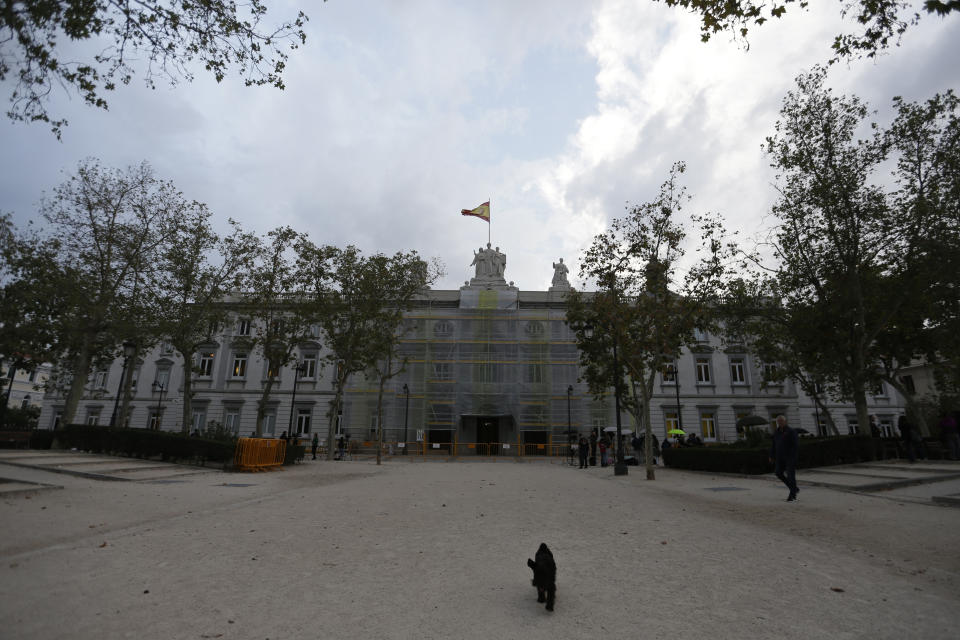AP Explains: A look at the verdict in Spain separatist trial
BARCELONA, Spain (AP) — A dozen Catalan politicians and activists have been convicted on charges of sedition, misuse of public funds and disobedience for their role in an illegal and failed secession attempt for the northeastern region of Spain in 2017.
Former regional vice president Oriol Junqueras received the heaviest sentence of 13 years in prison for sedition and misuse of public funds. Eight more, including former members of the Catalan Cabinet, the ex-speaker of the Catalan parliament and two leaders of separatist grassroots groups received sentences ranging from nine to 12 years. Three were fined but won't go to prison.
The trial is considered the most important for the country since democracy was restored following the death of dictator Gen. Francisco Franco in 1975. The verdict's political and social repercussions promise to be profound and long-lasting.
__
WHAT WAS THE TRIAL ABOUT?
In October 2017, the separatist leaders of northeastern Catalonia tried to break the region away from the rest of Spain and create a new European state by declaring independence.
The attempt failed when it received no international recognition and Spain's government intervened and fired the regional government.
The separatist leaders convicted on Monday were arrested while other associates fled the country.
__
THE TRIAL
The trial of the dozen leaders who remained in Spain featured more than 500 witnesses, including former Prime Minister Mariano Rajoy, and 50 nationally televised hearings.
At the heart of the case was the Oct. 1, 2017 referendum that the Catalan government pushed to hold even after it was ordered not to by Spain's highest court since it was unconstitutional. Thousands of additional police sent to the region clashed with voters in a day that separatists have vowed never to forget. Most Catalans who don't want to sever centuries-old ties with the rest of Spain stayed home, and the "Yes" vote won. The Catalan Parliament declared independence on Oct. 27, setting off the worst political crisis in Spain in decades.
Prosecutors argued that the leaders of the secession drive violated the Spanish Constitution and threatened the nation's territorial integrity. The defense argued that the leaders of the secessionist movement were carrying out the will of roughly half of the 7.5 million residents of Catalonia who want to go their own way.
__
SOCIAL IMPACT
The jailed leaders have become a powerful symbol for separatists, who saw their pre-trial jailing for nearly two years as unfair. Many sympathizers wear yellow ribbons pinned to their clothes as a sign of protest.
Catalan separatists for several years have held largely peaceful rallies that can reach several hundreds of thousands of people, but recently the most radical activists have disrupted traffic, trains and clashed with police. Seven separatists are being investigated following their arrest in September on suspicion they were making explosives.
Separatists will most certainly try to use the verdict as another rallying point for their cause. Protests erupted across the region after the verdict was released.
The roughly one half of Catalonia's residents who support unity with Spain often complain that the secession question has monopolized politics and caused friction between families and friends.
__
POLITICAL IMPACT
Hard-line secessionists like current Catalan regional president Quim Torra have said that the social uproar he wants to stoke after the verdict could create a second opportunity to attempt a break with Spain.
More moderate separatists see that as far-fetched and argue for more realistic action, such as calling an early regional election in Catalonia to channel expected separatist anger into more votes for their parties.
But with its most charismatic leaders behind bars or fugitives abroad, the separatist movement is going through its most difficult stage since it revved up at the start of the decade. Its two main political parties disagree on what to do next, and the grassroots organizations that have driven the movement have begun criticizing the lack of action by their politicians.
The verdict also comes during the buildup to a second Spanish national election this year. On Nov. 10, Spaniards will go back to the polls and the Catalan question will be one of the top issues.
Given the fragmentation of the national parliament, the Catalan separatist parties could very easily hold the key to forming a new government for Spain.
__
APPEALS AND PARDONS
The verdict can't be appealed. The defense, however, can bring a violation of basic rights complaint to Spain's Constitutional Court, and from there the case could be taken to the European Court of Human Rights.
Spain's government can also issue pardons. A pardon needs to be requested formally after a conviction and by showing repentance. Some of the convicted leaders said they won't ask for one. Any prime minister who granted one would be applauded by many Catalans, but also slammed by political rivals across Spain.
__
PUIGDEMONT NEXT?
While Junqueras and the others on trial stayed to face Spanish justice two years ago, several cohorts fled to other European countries.
That includes ex-Catalan president Carles Puigdemont, who successfully fought extradition from Germany and Belgium and has taken up residence in Waterloo.
A Spanish judge issued an international arrest warrant for the fugitive Puigdemont hours after the verdict was released.
There are more separatist leaders wanted by Spanish law in Belgium, Switzerland, and Britain.



